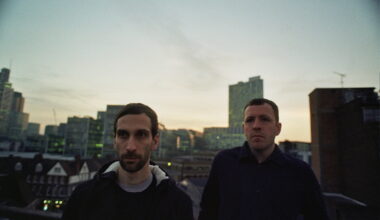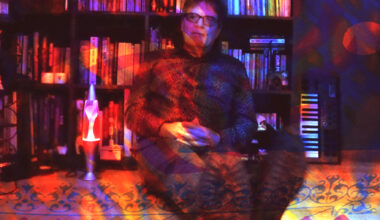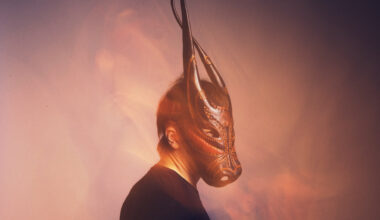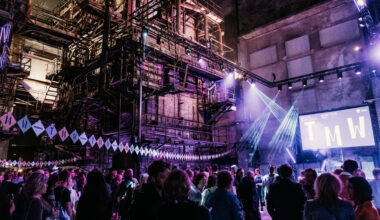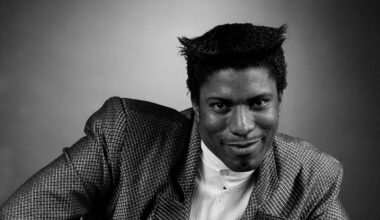Cabaret Voltaire and Wrangler man Stephen Mallinder gives a hugely entertaining and highly personal account of life at the centre of the Sheffield music scene in the 1970s and beyond
THE FISH TANK
“The Fish Tank referred to in the title was a giant tropical fishbowl (containing a real pirhana!) that occupied one side of the Hole in the Road, the centrepiece of Sheffield’s famous subway system. The Hole served as a focal point for a complex pedestrian network below ground (my Auntie Peg ran the Tights & Socks Bar in the subterranean shopping mall) and a giant roundabout for the traffic above. Now demolished but still part of Sheffield folklore, it was a meeting point for everyone. Jarvis (Cocker) nudged a memory for all of us as he recalled “my mum bringing me here to stop me from moaning when she was doing the shopping”.”
It’s very tempting to slip into comfortable clothes. In army surplus and charity shop chic, mumbling the story of how, against all odds, in a city with a paltry musical heritage (Joe Cocker, Dave Berry… Anyone else? No, don’t think so), a handful of pasty-faced art mavericks sprang like phoenixes from the ashes of Sheffield’s collapsing spaces to create revolutionary new sounds. Sounds that would quickly reverberate as far as Manchester. Well, OK, eventually London and a bit further. Pavement to penthouse.
I know all this. I’ve seen the smudged photos in back issues of the NME – factory walls, hollow cheeks, striking poses – a Ken Loach musical played on oscillators by people in long macs. After all, that’s what it was. A city of steel and magnesium, drop hammers and exploding arc furnaces spitting shards of phosphorescent light into the night, suddenly overtaken by slightly androgynous men with asymmetrical haircuts. We grew up in this habitat and, like mother’s milk, it was all we would see and hear. We couldn’t wait to mould the noises of the city into beats that would one day plant a flag on the global map of electronic music.
Industrial? You better fucking believe it!
But if it is your wish to imagine Sheffield as a city shaped solely in an image of this factory netherworld, doggedly making righteous music by the light of a 30 watt bulb, maybe grab your mac and leave. Or if you see it as a proto-hipster’s paradise where everyone walked around with a Roland SH-101 tucked under one arm, Kafka under the other (mmm, that’s an image), please jog on. A convenient “truth” peddled to outsiders who we perhaps preferred to keep at bay. In reality, the city seeped into us without our needing to consider it.
Comfortable in a rusting metal skin, we all inhabited this place taking its topography for granted – the Wicker Arches, the Hole in the Road, West Street – navigation points for work and play.
Sorry to disappoint, but this is not exclusively a question of place. It is as much a question of time. And although this adventure unfolds as a sclerotic steel industry exposed the city’s wear and tear, there were more dynamic forces at play. If our locality was familiar, unquestioned, to us incidental, what did not escape us was a world that was rapidly expanding as space was paradoxically collapsing. We were peering into other exotic places far beyond the end of our street. We watched them on the telly.
So this is the tale of a bunch of post-post-war progenies, connected by geography and factory semiotics, who grew up at the same time as television, high street fashion, seven-inch singles, consumer gadgets and the possibility of travel not afforded to our parents. A world which was becoming, minute by minute, less black and white, more colour. Less natural, more plastic. Less tangible, more imagined. Seemingly obtainable, this was a world no longer “if”, more “fucking when”?

And all this because technology was becoming ubiquitous. Now everything had a switch, a knob, a dial. An electronic panacea, a way to not only shape the collective future through gadgetry and convenience, but rather a quick click and turn to liberate yourself, express yourself, make a noise, escape the tyranny of place and time. Not enough to simply “be” something, it was now possible to “become” something. The desire to transcend is part of the human condition. Be other. Plug in, be electric. This wasn’t about the mucky past. Instead, we were the shiny sound of the future – although some of us were on a budget.
So maybe there’s another story, one where a bunch of hyperactive youths, creative souls who met at some kind of drama experiment called Meatwhistle (afraid that’s all I can say, I wasn’t there, not my thing). They soon splintered off into two connected factions, the more arty punky types to live in a foundry and agitate and write the seminal fanzine Gun Rubber.
The more shape-of-things-to-come types – enamoured with Ray Harryhausen, ‘Space 1999’ and silver jackets – played future games and tinkered with new machines.
But at a pivotal point, both these factions were as one in the scarcely heard, never performed, but still mythical band The Future. Stories of the early demo tape and confrontational meetings with confused A&R men are legendary. Adi Newton tells me they are soon to resurface. There was also an impromptu Psalter Lane Art College performance as The Studs, which included a guest appearance by three other budding electronic luminaries, all of them spectacularly drunk, that ended in the now familiar mayhem. Herein lies the beginnings of The Human League, Heaven 17 and Clock DVA, plus the aforementioned very hammered Cabaret Voltaire. Sheffield’s music history of the period is a collection of disappearing and often reappearing characters, overlapping and incomplete chapters with uncertain, sometimes sticky endings.
Or perhaps there’s another tale, this time of two suedeheads, one of them myself (guess who the other one was), who met at an underage soul club called The Ark and misspent their youth lurking around the city, doing a bit of shoplifting, playing pinball, sneaking into proper grown-up soul clubs and trying to look old enough by holding half pints of Skol. These two Harrington wearers would meet again a couple of years later, both now with a deep affection for David Bowie and Roxy Music, particularly that weird one who played a tape recorder and had a bald head but long hair.
Among their collection of mates, real horrorshow droogs, dressed to the nines, driving around in blacked-out vans and a Chevrolet Impala, one was a telephone engineer who had a fascination for sound and was very good at soldering things together to make strange noises.
Providentially, he also had a loft to record in. Enter Chris Watson. As Cabaret Voltaire, these three made sounds from another planet. Pranksters with high designs, they were surprisingly taken for rather seriously avant garde sorts, momentarily sucked into a polite contemporary music society – a world of worthy intentions and nice velvet jackets – before their Dada tendencies and general behaviour got them shown the door with undue ceremony.
For all those kooky electronic bands that were emerging from Sheffield’s shadows, time and technology and (a lack of) technique helps pick the lock and find the treasure. We were gorging on TV and musical otherness – Edgard Varèse, Lou Reed, Iggy Pop, Kraftwerk, you name it, anything that snubbed its nose at rock convention or pretension, we wanted it. But like fatherless children (which, incidentally, a few of us were), we had no local scene to follow, no bands of our own to emulate, no people to ask, get close to and wonder at. I can’t remember any of us who could play an instrument, read music, tune a guitar or hit a drum.
None of us were willing to lug an amp up a flight of pub stairs. But we were good at looking, listening, absorbing it all. Speaking for ourselves, we figured the only way to do music was the Eno way – easy access tape recorders, a synthesiser made by Chris, a £5 bass, a clarinet, a couple of effects boxes, and that was it. Sounds created, delayed, captured. Success.
This technology thing was important. Well, this is an electronic music story after all. As very early adopters, much was make-and-make-do, but EMS was our holy grail. After a pilgrimage to Putney Bridge in London, to the EMS control centre itself, Chris bought a Synthi A, “a synth in a suitcase”, more ‘Man From UNCLE’ than Manfred Mann and, most importantly, a non-musical pathway through sound. We inhabited a borderless world, defying form, tune, accepted order, and only recorded on magnetic tape.
By the time we began to play live, this had been corralled into some sort of structure with, yes, instruments. Vox organ, guitar, drum machine, but all treated and processed through electronic tools, the EMS Hi-Fli increasingly predominant. We began pre-synthesiser, as most people understand it, before the analogue boom where synths had proper keyboards, a sense of (wonky) tuning, and a way to make proto, if not proper music. We jumped in to get an SH-101 and then a sequencer, but Martyn (Ware) and Ossie (Ian Craig Marsh) seemed to have cleaned out the available supplies of Roland and other plastic technology. By 1980, synths were obligatory and it seemed every post-punk outfit in town had a Wasp. Steel City became Buzz City.

There were essentially two music shops in Sheffield at this point. One was Carlsboro Sound on Ecclesall Road, which was squatted on a daily basis by hairies taking it in turns to play ‘Stairway To Heaven’. The other was Musical Sounds on London Road, a place of lesser esteem but with more bits and bobs of the emerging technology. This was also the place where Richard, Chris and I were compromised by a man with a wooden leg as we tried to negotiate a purchase. Dragged outside, this Dickensian character proceeded to sell us a Farfisa drum machine from the back of his van – our first and still my favourite. For a simple cash deal, we had become a new type of band – rhythm in a box, beats with no fuss, the drummerless trio was born.
So why Sheffield? Was the electricity better? Was it an absence of music history, with less to mimic or rival? Was it because there was nowhere to go, nowhere to play, so we simply made noises in old empty buildings for our own amusement?
One interesting piece of information told to me many years ago by music journalist Andy Gill, at the time a student, a Sheffield émigré but very much part of the narrative, was that sales of Roxy Music records in the city were disproportionately high compared to the rest of the UK. A strange phenomenon, perhaps alluding to our poseur tendencies. Like many a northern town, we loved to dress up of a Saturday night. Peacocks with sooty wings.
But it also goes some way to explaining why the city seemed to produce flamboyant weirdness and this peer group of budding Brian Enos: “Well, that singer Bryan is OK, pretty reptilian, but the other Brian, the one who wears a feather boa and plays the telephone switchboard, is loads cooler”. Suffice to say, Sheffield was quick to have its own Roxy, a wonderfully hedonistic band called The Extras, who followed the template in granular detail, right down to a pint-sized Geordie doppelganger “other Bryan” frontman in the much missed John Lake. Acknowledgement due.
Although it would seem that all the city’s bands adopted something from this art of the awkward spectacle, The Human League, perhaps more than most, seemed the inheritors of the Roxy effect. Quickly catching on to the slipstream of the punk rocket, they released the wonderful ‘Being Boiled’ EP on Fast Product, before being signed to moneybagged but non-conformist Virgin Records. ‘Reproduction’, their debut album, was written in 1979, when little England was still getting its head around what a Sex Pistol was.
Sheffield, it appeared, was on a much faster and electronic track to the future. Bands were popping up like flowers in the dirt, each with the city shimmer in its DNA. Artery remain perhaps the seminal Sheffield band – Wire from S6. A heady mix of art, artifice, postures and angles, they were everywhere in the city. By 1980, we also had Neutron Records, Sheffield’s first real label, releasing the ‘First 15 Minutes’ EP, with contributions from Clock DVA, I’m So Hollow and Vice Versa (Neutron founder Steve Singleton’s band). There was also Pulp, a constant tangent in the city’s music. Like Jack Torrance in ‘The Shining’, they have always been here. You know them for hits, wool knits and Jarvis’ global appeal. We know them for gigs in Rotherham, daft situations and a relentless drive. Not exactly electronic, not exactly not, they certainly got it and we got them.
The mini paradigm shift came in 1978-79, as Sheffield began to witness its second generation, in part led by newcomers who had decided to come to the city to study, but in truth many simply wanted to plunge head first into this new music mess. Martin Fry, a Manchester lad taking an English degree, joined forces with Steve Singleton and Mark White from Vice Versa to start ABC. Members of Hula came from the north east to make base camp in the city too. Well, actually, in my house, Hula Kula being the name of the infamous haunted “castle” we all lived in. Chakk comprised of a mixed bunch of architecture students and other assorted scholars, and Workforce the same. The Humberstone twins, Klive and Nigel, arrived in Sheffield distilling their Joy Division affections to form In the Nursery, a continuing catalyst.
This was a city that didn’t have much in the way of safe havens to play and show out – nighttime spots where you wouldn’t get battered for wearing odd socks. Before a couple of post-punk hippies had a dream, that we all managed to see, of converting an old bus depot into an arts hub and club, namely The Leadmill, The Limit was the most popular place. The earlier Penthouse also deserves an honourable mention for its tolerant music policy and a stage on which to experiment.
But by 1978, others began to fill the void and stoke the fires by putting on gigs. The Now Society promoted legendary Monday nights at the university’s Union Bar 2 featuring all the bands from the nascent scene. The gigs were run by, among others, Pam Young from Zoo Records and Ian Anderson, an early career musician (cough) and founder of The Designer’s Republic. These new city slickers were evidence that Sheffield had become a destination for waifs, strays and cultural nomads – welcome one and all.
The Sheffield electronic music scene was becoming a thing of substance, of people, places and early enterprise. It was moving under its own momentum, starting to figure out how to dance to its own beat. Londoners and others from beyond were venturing north, rather than the other way round. We’re now crossing over into legacy, as the next lot of movers and shakers started to put a roof on the building these neoteric dreamers had imagined. With former NME writer Amrik Rai at the helm (gawd help us), FON Records, independent store and label, would become the launchpad for FON Studios, Rob Gordon its in-house maestro, which in turn begat Warp Records.
And so a final word to acknowledge how Steve (Beckett) and the late Rob (Mitchell) would carry the baton, building first a shop, then a label, and eventually an empire. Importantly, Warp’s worldwide reputation built upon local resources – so let’s hear it for those to come, for Jive Turkey, Winnie, Parrot and the Park Hill flats, and for everyone else from Heeley, Pitsmoor, Woodhouse and all the city hinterlands who built the music house.
This is a dip in the puddle of the embryonic Sheffield scene. I couldn’t possibly tell it all or be responsible for the detail. But I think we should also make mention of those outside the city walls who quickly recognised things were afoot in South Yorkshire and were so important in its musical history.
Jon Savage was the first to recognise and write about Cabaret Voltaire, playing a crucial part in attracting Geoff Travis’ attention and setting up our debut for Rough Trade. Richard Boon, from New Hormones in Manchester, was another big supporter, adding Cabaret Voltaire to the Buzzcocks bill at The Lyceum in London before anybody had ever heard us. Then there was Tony Wilson, who asked us to appear at the first Factory nights and on the first Factory release, then put us on the telly and gave us the honour of being the first band to play The Hacienda, even though there was no one there. And Bob Last from Fast Product in Edinburgh, who released the very first Human League record and started such a significant chain of events.
So respect to them all.
To verify or dismiss my spurious history and anecdotes, I do recommend the reader wade in a little deeper.
The whole period was covered by the local music gumshoe, the wonderful and much missed Martin Lilleker, who wrote for the Sheffield Star and the Morning Telegraph and whose ‘Beats Working For A Living’ (Juma, 2005) is bumper annual of Sheffield bands from 1973 to 1984. Eve Woods’ ‘Made In Sheffield’ documentary (2001) and the follow-up ‘The Beat Is The Law’ (2011), which takes in the later insurgent period, will add more grist to the mill. But a real must is ‘Kafka Chic’ (2014), a radio play by the musical soul of the city, the evergreen Michael Somerset Ward, and next generation Sheffield electrician Dean Honer, with contributions from Phil Oakey, Adi Newton, Glenn Gregory and myself. Finally, though not for the faint-hearted, look online for ‘Sheffield Is Not Sexy’, a journal article I wrote for Nebular (2007) about the rhythms of the city.

